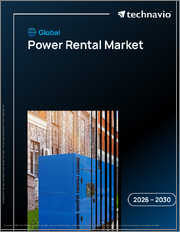
|
시장보고서
상품코드
1627614
전력 렌탈 시장 : 예측(2025-2030년)Global Power Rental Market - Forecasts from 2025 to 2030 |
||||||
세계 전력 렌탈 시장은 연평균 7.59%의 CAGR로 성장하여 2025년 244억 800만 달러에서 2030년에는 351억 8800만 달러의 시장 규모에 도달할 것으로 예상됩니다.
전 세계 각지의 전력 소비 증가는 분석 기간 동안 전력 렌탈 시장을 이끄는 가장 중요한 요인 중 하나입니다.
특히 석유 및 가스 산업은 탐사 및 생산 활동과 인프라 건설에 도움이 되는 렌탈 발전기를 가장 많이 사용하는 분야입니다. 이는 전력 설비 아웃소싱의 이점에 대한 인식에 의해 보완되고 있습니다. 또한 정전이나 전압 강하 및 강압에 대응할 수 있는 확장 가능한 렌탈 장비에 대한 수요도 증가하고 있습니다.
또한, 호텔 및 쇼핑몰 건설, 지하철 및 공항 네트워크의 확장을 촉진하는 정부의 노력도 선진국과 신흥국의 전력 대여 수요를 촉진하고 있습니다. 또한, 이산화탄소 배출량을 줄이기 위해 화석연료 대신 재생에너지 자원의 사용이 증가하고 있는 등 다른 요인들도 시장 성장을 가속화할 것으로 보입니다.
세계 전력 렌탈 시장의 촉진요인
- 도시화와 인프라 개발이 세계 전력 렌탈 시장 성장에 기여합니다.
신흥국의 전력 렌탈 시장을 이끄는 주요 요인 중 하나는 도시화와 인프라 개발의 발전입니다. 도시가 성장함에 따라 인프라 프로젝트가 증가함에 따라 눈에 보이는 안정적인 전력 공급에 대한 수요가 증가합니다. 기계와 설비에 막대한 전력을 소비하는 건설 활동의 예로는 주로 도로와 교량 등 공공 인프라가 건설되는 상업용 건물과 주택을 들 수 있습니다. 많은 기업들은 전력 설비를 구매하고 유지하기보다는 임대하는 경향이 있습니다. 이러한 발전으로 인해 현대 도시 개발 이니셔티브에서 전력 렌탈이 주류가 되는 수요가 확대되었습니다.
세계 전력 렌탈 시장의 지리적 전망:
- 북미는 예측 기간 동안 급격한 성장세를 보이고 있습니다.
허리케인, 산불, 폭풍우 등 이상기후 발생 빈도가 증가함에 따라 북미 전력 렌탈 시장이 크게 성장하고 있습니다. 이로 인해 단기적인 전력 고정을 필요로 하는 정전이 자주 발생합니다. 또한, 안정적이고 신뢰할 수 있는 전력 공급은 이 지역의 산업 및 인프라 발전에 필수적이기 때문에 렌탈 전력 서비스는 제조 시설, 임시 건물, 건설 현장에 매우 중요합니다. 또한, 북미 시장은 엄격한 규제를 충족하기 위해 기업들이 채택하고 있는 환경 친화적이고 에너지 효율적인 모델 등 발전기 기술 개발의 혜택을 누리고 있습니다.
이 보고서를 구매해야 하는 이유
- 통찰력 있는 분석 : 고객 부문, 정부 정책 및 사회경제적 요인, 소비자 선호도, 산업별, 기타 하위 부문에 초점을 맞추고 주요 지역뿐만 아니라 신흥 지역까지 포괄하는 상세한 시장 인사이트를 얻을 수 있습니다.
- 경쟁 상황 : 세계 주요 기업들이 채택하고 있는 전략적 전략을 이해하고, 적절한 전략을 통한 시장 침투 가능성을 파악할 수 있습니다.
- 시장 동향과 촉진요인 : 역동적인 요인과 매우 중요한 시장 동향, 그리고 이들이 향후 시장 발전을 어떻게 형성할 것인지에 대해 알아봅니다.
- 실행 가능한 제안 : 역동적인 환경 속에서 새로운 비즈니스 스트림과 수익을 발굴하기 위한 전략적 의사결정을 내릴 수 있도록 인사이트를 활용합니다.
- 다양한 사용자에 대응 : 스타트업, 연구기관, 컨설턴트, 중소기업, 대기업에 유익하고 비용 효율적입니다.
어떤 용도로 사용되는가?
산업 및 시장 인사이트, 사업 기회 평가, 제품 수요 예측, 시장 진입 전략, 지리적 확장, 설비 투자 결정, 규제 프레임워크 및 영향, 신제품 개발, 경쟁의 영향
조사 범위
- 2022-2030년 실적 데이터 및 예측
- 성장 기회, 도전과제, 공급망 전망, 규제 프레임워크, 고객 행동, 트렌드 분석
- 경쟁사 포지셔닝, 전략 및 시장 점유율 분석
- 부문 및 국가를 포함한 지역별 매출 성장 및 예측 분석
- 기업 프로파일링(전략, 제품, 재무상태, 주요 발전 등)
목차
제1장 소개
- 시장 개요
- 시장 정의
- 조사 범위
- 시장 세분화
- 통화
- 가정
- 기준 연도와 예측 연도 타임라인
- 이해관계자에 대한 주요 이점
제2장 조사 방법
- 조사 설계
- 조사 과정
제3장 주요 요약
- 주요 조사 결과
- CXO의 견해
제4장 시장 역학
- 시장 성장 촉진요인
- 시장 성장 억제요인
- Porter's Five Forces 분석
- 업계 밸류체인 분석
- 애널리스트의 견해
제5장 세계의 전력 렌탈 시장 : 연료별
- 소개
- 디젤
- 가스
제6장 세계의 전력 렌탈 시장 : 용도별
- 소개
- 스탠바이
- 피크 컷
- 기저부하
제7장 세계의 전력 렌탈 시장 : 최종사용자별
- 소개
- 석유 및 가스
- 건설
- 광업
- 이벤트
- 기타
제8장 세계의 전력 렌탈 시장 : 지역별
- 소개
- 북미
- 연료별
- 용도별
- 최종사용자별
- 국가별
- 남미
- 연료별
- 용도별
- 최종사용자별
- 국가별
- 유럽
- 연료별
- 용도별
- 최종사용자별
- 국가별
- 중동 및 아프리카
- 연료별
- 용도별
- 최종사용자별
- 국가별
- 아시아태평양
- 연료별
- 용도별
- 최종사용자별
- 국가별
제9장 경쟁 환경과 분석
- 주요 기업과 전략 분석
- 시장 점유율 분석
- 합병, 인수, 합의, 협업
- 경쟁 대시보드
제10장 기업 개요
- Wartsila
- United Rentals Inc.
- Caterpillar
- Sunbelt Rentals Ltd
- Wacker Neuson SE
- Herc Rentals Inc.
- Atlas Copco(India) Ltd
- Cummins Inc.
- Aggreko
- Generac Power Systems, Inc
- Sudhir Power
- Modern Energy Rental
- Pon Energy Rental
- Power Link Energy
- BPC Power Rental
The global power rental market is expected to grow at a CAGR of 7.59%, reaching a market size of US$35.188 billion in 2030 from US$24.408 billion in 2025.
The increasing power consumption in various parts of the world is one of the most important factors driving the market for power rental during the analysis period.
Notably, the oil and gas industry is the most prominent user of rented power generators, which serve its exploration and production activities and for building infrastructure. This is also complemented by awareness of the benefits of outsourcing power equipment. Another emerging demand is for scalable rental equipment to cope with outages and voltage sags and swells.
Moreover, the construction of hotels and malls, besides government initiatives promoting the expansion of metro and airport networks, is also driving power rental demand in developed and developing countries. The market will register faster growth due to other factors, such as the increasing use of renewable energy resources in place of fossil fuels in an attempt to cut down carbon emissions.
Global Power Rental Market Drivers
- Urbanization and the development of infrastructure are contributing to the global power rental market growth
The growing urbanization propelled by ongoing urban and infrastructure development remains one of the major factors pushing the power rental market in developing economies. As cities grow, the demands for visible and reliable power sources increase as more infrastructure projects arise. Examples of construction activities that consume enormous amounts of power for machinery and equipment are commercial and residential buildings where public infrastructure, intended mainly for roads and bridges, is built. Most firms are more inclined to rent power equipment than purchase and maintain it; power equipment is usually required for short-term use. Such developments thus scaled the demand for becoming mainstream in contemporary urban development initiatives for power rental.
Global Power Rental Market geographical outlook:
- North America is witnessing exponential growth during the forecast period.
The increasing frequency of extreme weather events like hurricanes, wildfires, and storms is driving significant growth in the North American power rental market. This frequently results in power outages that call for short-term power fixes. Furthermore, a steady and dependable power supply is required for the region's industrial and infrastructure advancements, which makes rental power services crucial for manufacturing facilities, temporary buildings, and construction sites. In addition, the North American market gains from technological developments in generator equipment, such as more ecologically friendly and energy-efficient models that companies are embracing to satisfy strict regulations.
Reasons for buying this report:-
- Insightful Analysis: Gain detailed market insights covering major as well as emerging geographical regions, focusing on customer segments, government policies and socio-economic factors, consumer preferences, industry verticals, other sub- segments.
- Competitive Landscape: Understand the strategic maneuvers employed by key players globally to understand possible market penetration with the correct strategy.
- Market Drivers & Future Trends: Explore the dynamic factors and pivotal market trends and how they will shape up future market developments.
- Actionable Recommendations: Utilize the insights to exercise strategic decision to uncover new business streams and revenues in a dynamic environment.
- Caters to a Wide Audience: Beneficial and cost-effective for startups, research institutions, consultants, SMEs, and large enterprises.
What do businesses use our reports for?
Industry and Market Insights, Opportunity Assessment, Product Demand Forecasting, Market Entry Strategy, Geographical Expansion, Capital Investment Decisions, Regulatory Framework & Implications, New Product Development, Competitive Intelligence
Report Coverage:
- Historical data & forecasts from 2022 to 2030
- Growth Opportunities, Challenges, Supply Chain Outlook, Regulatory Framework, Customer Behaviour, and Trend Analysis
- Competitive Positioning, Strategies, and Market Share Analysis
- Revenue Growth and Forecast Assessment of segments and regions including countries
- Company Profiling (Strategies, Products, Financial Information, and Key Developments among others)
The Global power rental market is segmented and analyzed as follows:
By Fuel
- Diesel
- Gas
By Application
- Standby
- Peak Shaving
- Baseload
By End-user
- Oil & gas
- Construction
- Mining
- Events
- Others
By Geography
- North America
- USA
- Canada
- Mexico
- South America
- Brazil
- Argentina
- Others
- Europe
- United Kingdom
- Germany
- France
- Italy
- Spain
- Others
- Middle East and Africa
- Saudi Arabia
- UAE
- Others
- Asia Pacific
- China
- Japan
- India
- South Korea
- Australia
- Others
TABLE OF CONTENTS
1. INTRODUCTION
- 1.1. Market Overview
- 1.2. Market Definition
- 1.3. Scope of the Study
- 1.4. Market Segmentation
- 1.5. Currency
- 1.6. Assumptions
- 1.7. Base and Forecast Years Timeline
- 1.8. Key Benefits to the Stakeholder
2. RESEARCH METHODOLOGY
- 2.1. Research Design
- 2.2. Research Processes
3. EXECUTIVE SUMMARY
- 3.1. Key Findings
- 3.2. CXO Perspective
4. MARKET DYNAMICS
- 4.1. Market Drivers
- 4.2. Market Restraints
- 4.3. Porter's Five Forces Analysis
- 4.3.1. Bargaining Power of Suppliers
- 4.3.2. Bargaining Power of Buyers
- 4.3.3. Threat of New Entrants
- 4.3.4. Threat of Substitutes
- 4.3.5. Competitive Rivalry in the Industry
- 4.4. Industry Value Chain Analysis
- 4.5. Analyst View
5. GLOBAL POWER RENTAL MARKET BY FUEL
- 5.1. Introduction
- 5.2. Diesel
- 5.3. Gas
6. GLOBAL POWER RENTAL MARKET BY APPLICATION
- 6.1. Introduction
- 6.2. Standby
- 6.3. Peak Shaving
- 6.4. Baseload
7. GLOBAL POWER RENTAL MARKET BY END-USER
- 7.1. Introduction
- 7.2. Oil & gas
- 7.3. Construction
- 7.4. Mining
- 7.5. Events
- 7.6. Others
8. GLOBAL POWER RENTAL MARKET BY GEOGRAPHY
- 8.1. Introduction
- 8.2. North America
- 8.2.1. By Fuel
- 8.2.2. By Application
- 8.2.3. By End-User
- 8.2.4. By Country
- 8.2.4.1. USA
- 8.2.4.2. Canada
- 8.2.4.3. Mexico
- 8.3. South America
- 8.3.1. By Fuel
- 8.3.2. By Application
- 8.3.3. By End-User
- 8.3.4. By Country
- 8.3.4.1. Brazil
- 8.3.4.2. Argentina
- 8.3.4.3. Others
- 8.4. Europe
- 8.4.1. By Fuel
- 8.4.2. By Application
- 8.4.3. By End-User
- 8.4.4. By Country
- 8.4.4.1. United Kingdom
- 8.4.4.2. Germany
- 8.4.4.3. France
- 8.4.4.4. Italy
- 8.4.4.5. Spain
- 8.4.4.6. Others
- 8.5. Middle East and Africa
- 8.5.1. By Fuel
- 8.5.2. By Application
- 8.5.3. By End-User
- 8.5.4. By Country
- 8.5.4.1. Saudi Arabia
- 8.5.4.2. UAE
- 8.5.4.3. Others
- 8.6. Asia Pacific
- 8.6.1. By Fuel
- 8.6.2. By Application
- 8.6.3. By End-User
- 8.6.4. By Country
- 8.6.4.1. China
- 8.6.4.2. Japan
- 8.6.4.3. India
- 8.6.4.4. South Korea
- 8.6.4.5. Indonesia
- 8.6.4.6. Taiwan
- 8.6.4.7. Others
9. COMPETITIVE ENVIRONMENT AND ANALYSIS
- 9.1. Major Players and Strategy Analysis
- 9.2. Market Share Analysis
- 9.3. Mergers, Acquisitions, Agreements, and Collaborations
- 9.4. Competitive Dashboard
10. COMPANY PROFILES
- 10.1. Wartsila
- 10.2. United Rentals Inc.
- 10.3. Caterpillar
- 10.4. Sunbelt Rentals Ltd
- 10.5. Wacker Neuson SE
- 10.6. Herc Rentals Inc.
- 10.7. Atlas Copco (India) Ltd
- 10.8. Cummins Inc.
- 10.9. Aggreko
- 10.10. Generac Power Systems, Inc
- 10.11. Sudhir Power
- 10.12. Modern Energy Rental
- 10.13. Pon Energy Rental
- 10.14. Power Link Energy
- 10.15. BPC Power Rental




















